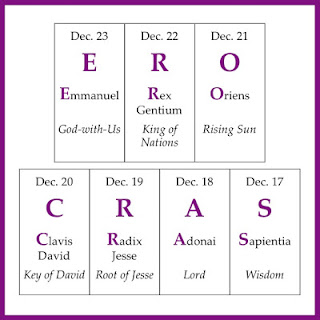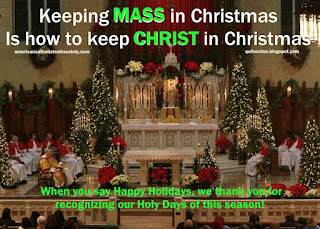Well, so goes the headline of an article written for The Washington Post, December 21, 2018.
The writer, a Jewish person named Julia Ioffe, wrote this while acknowledging it is a dominant American cultural event, but being Jewish - she does not celebrate this holiday. Why? Because it is not just a secular holiday, which certainly it has become, but as the name states - it is the recognition of the birth of Jesus the Christ in Christianity - a point which Ms. Ioffe does acknowledge as well.
Ms. Ioffe also acknowledges that she planned on going to a Christmas party at a friend's house and was planning on bringing Christmas presents out of respect for their family practice. This writer finds that a bit ironic that Ms. Ioffe complains on one hand that she is not a Christian so do not be impolite or alienating in wishing her a Merry Christmas, yet, on the other hand, she has no problem attending a Christmas party and celebrating Christmas in the tradition of her Christian friends. "The lady doth protest too much. methinks" (Shakespeare, 1601).
I saw this on Twitter, and one of the respondents there (@OldTom_Morris) said "If I lived in a majority Muslim nation, and people wished me a happy Ramadan, why on earth would I be offended by that?" Mr. Morris makes perfect sense here! Many of you reading this blog are aware that I annually wish everyone a "Happy Chanukah" which is a Jewish celebration. Of course, in that case, I do argue that it really should be a Christian celebration as well since, without Chanukah, or more specifically, the Maccabees, we would not have a Christmas - or it would be significantly different than the way it is celebrated and has been for some 2000 years now. But I digress, the point is there is no real reason to be "offended" by someone wishing you a Merry (or Happy) Christmas season (or day), or a Happy Ramadan, or Happy Chanukah, etc. Why not have enough goodwill to simply accept the good wish from a fellow human?
This brings me back to a recent article here on Qui Locutus - Peace - to men of goodwill (Windsor, 2021). Ms. Ioffe does not express goodwill to her fellow man (or woman) in her article. Now, I do not wish her ill-will, but the verse, literally translated is not "goodwill to men" but "peace on earth, to men of goodwill" (Windsor, 2021). If I could reach out to Ms. Ioffe, I would ask her to be more open to accepting others where they are and as @OldTom_Morris said, accepting that where she is, in a country that is predominantly Christian, she should not be offended when one of "us" wishes her a Happy Christmas season. Be a person of goodwill, be at peace - and may the peace of God which surpasses all understanding be with her - and be with the readers here.
References






































